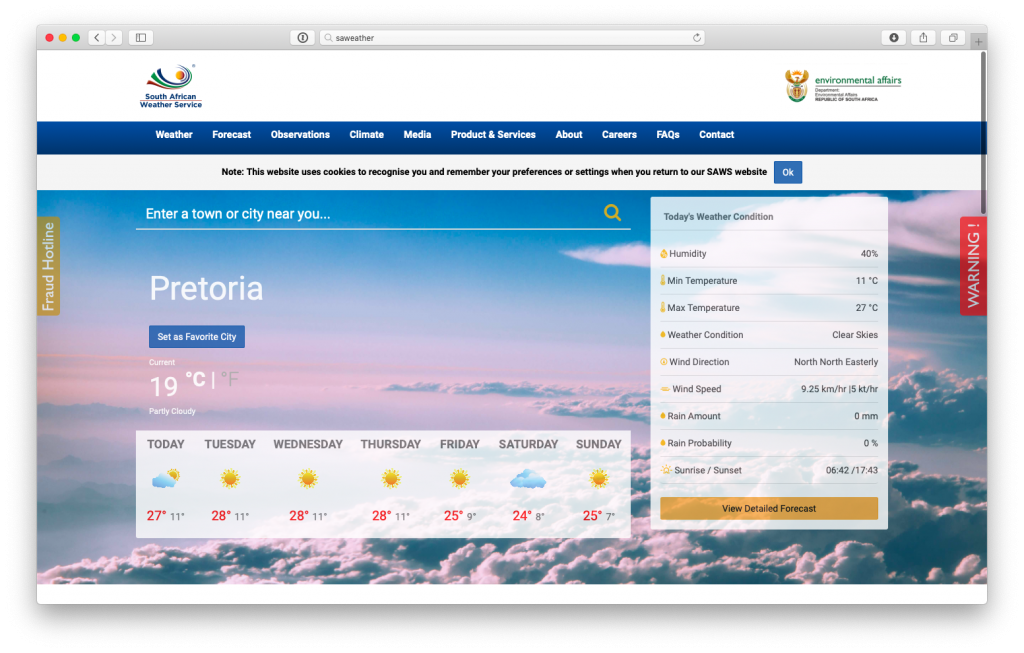1. Pollen can be dangerous
The weekly pollen counts use a “traffic light system” to warn of high and very high pollen counts in the monitored regions of South Africa
Pollen allergy sufferers – particularly asthmatics – should take action when counts are RED. Outdoor activities should be limited and medications used.
On November 21st 2016, an unusual thunderstorm occurred in Melbourne Australia during the peak of grass pollen season. Within 30 hours there were more than 8000 excess chest-related presentations to emergency departments, 35 intensive care admissions and ten asthma-related deaths.
2. Day-to-day weather during pollen seasons
There is day-to-day variation in the amount of pollen in the air of your area.
Examples of how short-term changes of weather are likely to affect the pollen in the air include:
- Hot, still days with little cloud cover are the days when pollen will be highest during periods when weekly counts are reported as moderate – very high (see legend on main page).
- Pollen counts will tend to be higher in the afternoon than in the mornings.
- Rain ‘scrubs’ pollen from the air and little pollen is released in wet, damp weather. However, pollen counts may surge after a period of rainy days during the season when plants are flowering.
- Windy days can bring new pollens into your area and distribute pollen widely, often triggering symptoms.

3. I am suffering – what now?
Pollen allergy tends to give three major clinical problems: Allergic rhinitis, conjunctivitis and asthma.
It simple terms this is a: runny or congested nose, sneezing, itching eyes, post-nasal drip, sore throat, and tightness of the chest, coughing or shortness of breath.
The first step is to make the connection between these symptoms and pollen in the air. Knowing the pollen counts may even allow you to identify specific pollens you are allergic too as these can differ from person to person. See weekly featured pollen.
It is easy to confuse allergy symptoms with a common cold. The common cold does not itch, and symptoms tend to only last 7-10 days.
If you think you have allergic rhinitis or asthma you should consult your doctor for more detailed allergy tests and specific advice about treatment options.
4. Allergy diagnosis – why?
Knowing what is in the air may allow you to identify specific triggers.
Your doctor or allergy specialist will likely confirm your specific allergy triggers using either blood testing (specific IgE) or skin prick testing. Allergy sufferers are frequently allergic to multiple things in the air such as pollen and house dust mites. Further information about diagnostic testing can be found on the Allergy and Immunology unit’s website)
Knowing what you are allergic to will allow:
- Treatment planning
- Specific avoidance measures if possible
- Consideration for Immunotherapy
5. The basics of pollen allergy treatment
Numerous over-the-counter treatment options are available for symptom control of pollen allergy. Several other important treatments require prescription and medical review.
We would advise, especially for anyone experiencing asthma symptoms due to pollen, to consult a doctor with allergy expertise.
Over-the-counter options include:
- Nasal sprays including salt water rinsing, coating sprays to prevent allergen access to the nasal mucosa, and antihistamine sprays
- Several antihistamines and generics
NOTE: Always ask for non-sedating anti-histamines such as certrizine, levocertrizine, loratadine, desloratadine, fexofenadine, or rupatudine if you need to work.
Sedating older generation anti-histamines include promethazine and chlorpheniramine are not advised if you wish to concentrate/work effectively and can even impact driving or operating machinery.
Prescription medications include:
- Intranasal, intraocular or inhaled corticosteroids. Several very effective preparations are available to treat allergic rhinitis (hay fever), allergic conjunctivitis and asthma respectively.
NOTE: Effective therapy with intranasal steroid will take time, usually 2-6 weeks, to be maximally effective. Therapy for pollen allergy should be started a few weeks prior to the spring pollen peak. This therapy will not provide acute relief.
- Allergen Immunotherapy
In severe cases not responding to and/or controlled with the above treatments, pollen allergen immunotherapy may be consider. In SA access to this therapy is still limited to a few specialist allergy centres, but severely affected patients should enquire with our Immunotherapy Unit. Further information is provided here:







